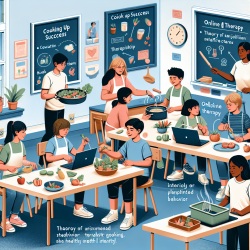Cooking Up Success: Encouraging Fifth Graders to Cook at Home
As a Special Education Director, you're always on the lookout for innovative ways to support students' development. One area that has recently gained attention is encouraging children to cook at home. A fascinating study titled "Cooking at Home: Correlates of Frequency and Intention in Fifth Graders" sheds light on this topic, offering valuable insights for educators and practitioners alike.
Understanding the Study
The study, conducted in Quebec, Canada, explored the determinants of cooking frequency and intention among fifth graders. Using the Theory of Planned Behavior as a framework, researchers identified key factors influencing children's cooking habits. The study found that more than two-thirds of participants had cooked at home in the past week, with intention being the primary variable explaining the frequency of cooking.
Key Findings
The study highlighted several determinants of intention to cook at home:
- Perceived Behavioral Control: Children's belief in their ability to cook significantly influenced their intention.
- Attitude: A positive attitude towards cooking was a strong predictor of intention.
- Descriptive Norms: Seeing peers engage in cooking activities encouraged children to do the same.
- Subjective Norms: Parental support and encouragement played a crucial role.
- Normative Beliefs: Children's perception of their parents' expectations influenced their cooking intentions.
Implications for Practitioners
For practitioners working in educational settings, these findings offer valuable insights into promoting cooking at home among children. Here are some practical steps to consider:
- Encourage Parental Involvement: Educate parents on the benefits of involving children in meal preparation and provide them with resources to support this activity at home.
- Foster a Positive Attitude: Create engaging cooking activities in schools that highlight the fun and rewarding aspects of cooking.
- Leverage Peer Influence: Organize group cooking sessions where children can learn from and motivate each other.
- Address Perceived Barriers: Provide children with the skills and confidence they need to overcome common cooking challenges.
Encouraging Further Research
While this study provides a solid foundation, there is still much to learn about children's cooking behaviors. Practitioners are encouraged to explore further research opportunities to better understand the long-term impact of cooking at home on children's health and development.
To read the original research paper, please follow this link: Cooking at Home: Correlates of Frequency and Intention in Fifth Graders.










